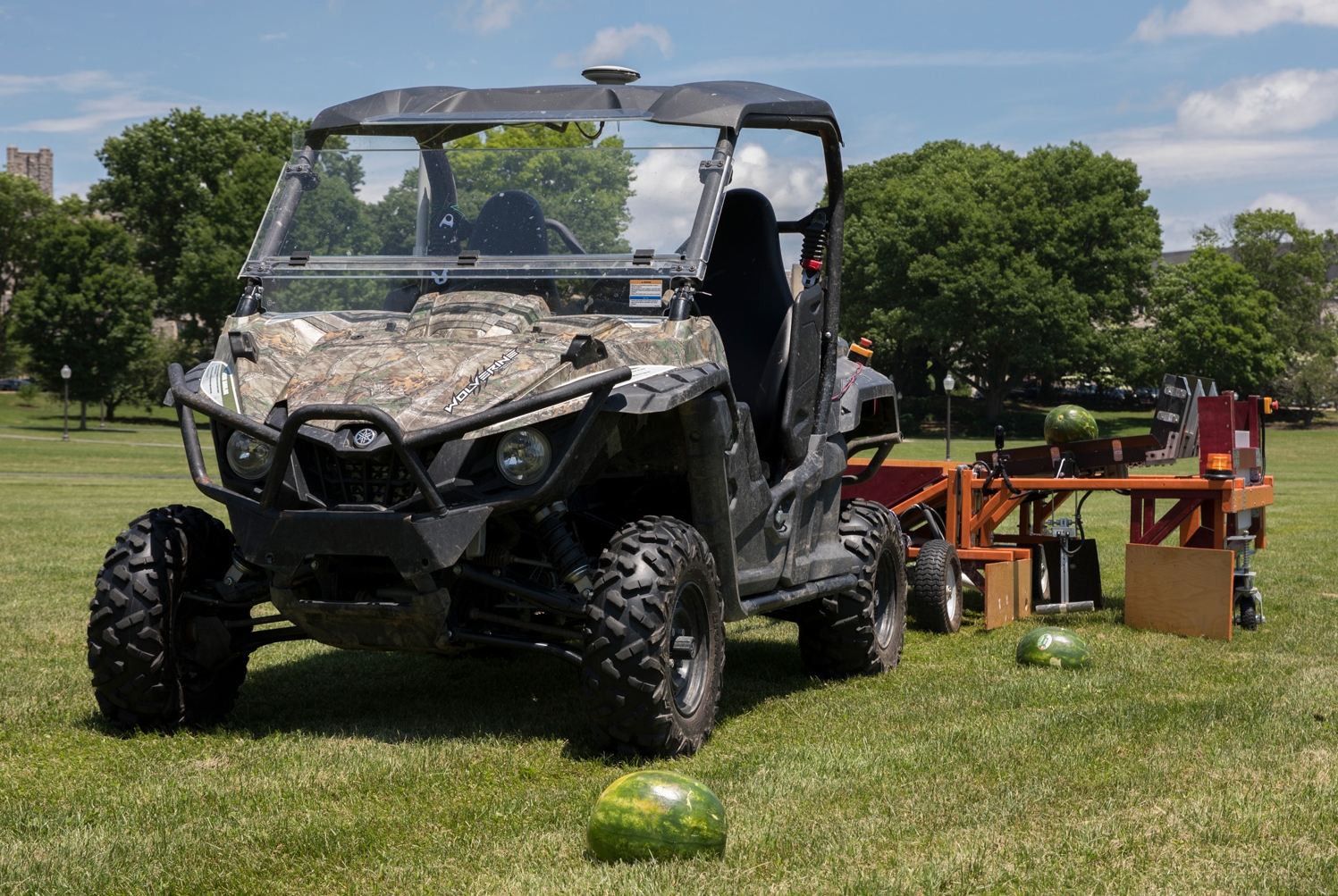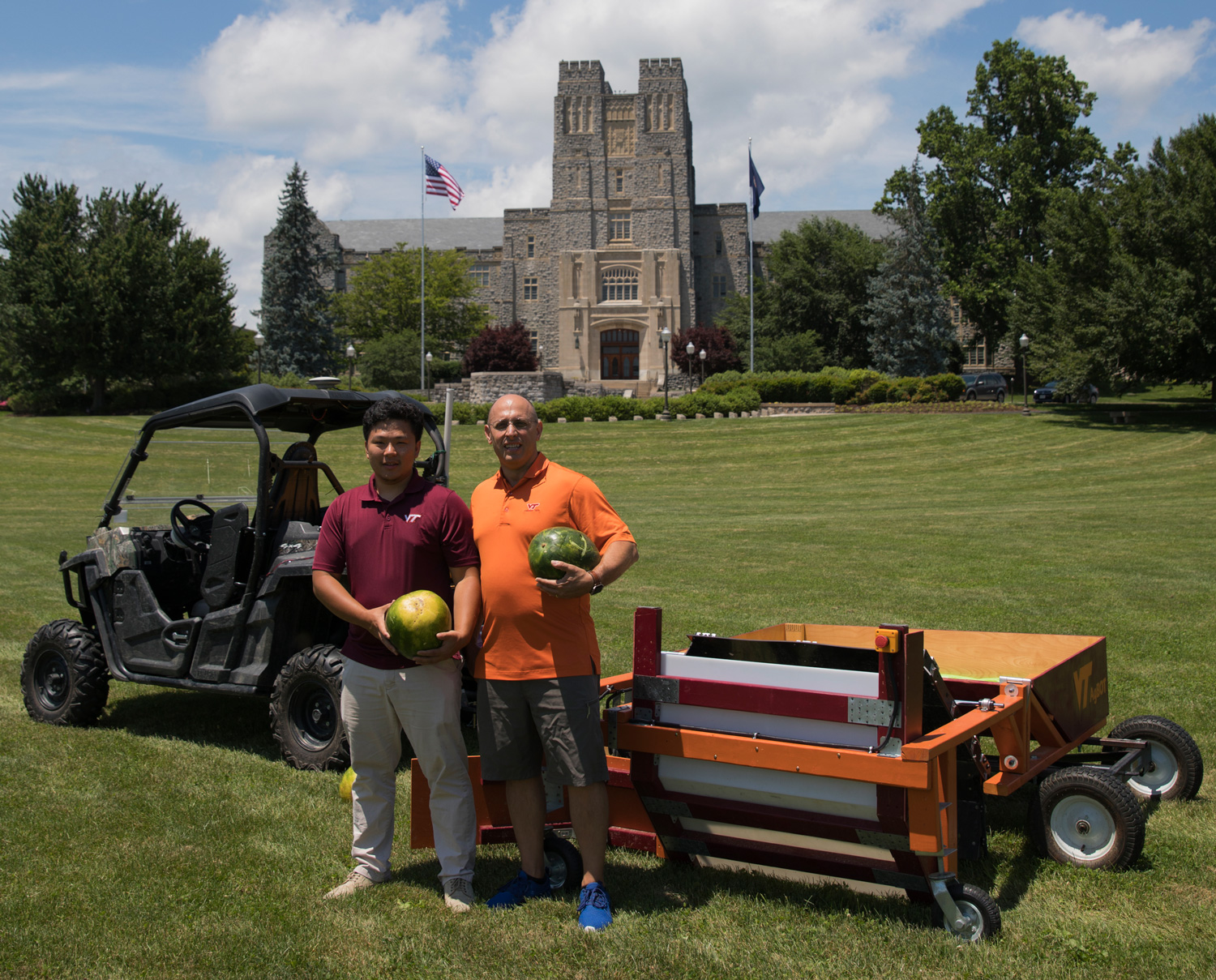Virginia Tech agBOT autonomous watermelon harvester takes top prize

The Virginia Tech agBOT team clinched first place in the third annual 2018 agBOT Challenge at Gerrish Farms in Rockville, Indiana, earning a top prize of $30,000.
The national event, hosted by Gerrish Farms and airBridge LLC, was broken into two separate challenges – weed and feed and harvesting – with university and industry teams competing head-to-head for $100,000 in prizes.
Virginia Tech’s team won the watermelon harvesting challenge by creating an autonomous system that could locate, identify, sort, and harvest ripe watermelons in a field. Each team in the harvesting competition was scored in mechanics, software, innovativeness of their solution, and execution of their solution.
Two separate teams were formed to tackle the competition challenges. A mechanical engineering senior design team was tasked with designing and building a harvester, while a second special studies team was responsible for an autonomous vehicle that towed the harvester. The latter was composed of volunteer mechanical, electrical, and computer engineering undergraduates and computer science students that together modified an ATV donated by Yamaha to make it autonomous.
As team lead for both teams, Hongxu “Howard” Guo, a double major in mechanical and electrical engineering, coordinated the work of 14 people.
“There was a very clear definition and set of responsibilities each of the teams had, but they were independent teams,” Guo said. “We learned a lot from last year, and this year we followed a systematic design process with Gantt charts and scheduling that allowed us to stay true to a deadline.”
The increased attention to schedules was an important shift for this year’s agBOT team, according to Sena Hunde, a master's student in mechanical engineering.
“Last year, our scope was too wide – we were trying to design an autonomous vehicle on top of the challenge vehicle and it wasn’t achievable. With the senior design team working on the harvester alone, we were able to really focus on the requirements of the challenge,” said Hunde.
With the tow vehicle, Guo and his special studies group used computer vision and machine learning technologies that allowed the vehicle to locate watermelons. When no melon was in sight, the vehicle used way-point navigation to find its way through the fields. When a watermelon was spotted, the machine’s cameras guided it toward the fruit. Once there, the harvester determined whether or not the melon was ripe.
The process humans have used for centuries to determine if a watermelon is ripe is to slap it and listen for a deep, hollow sound. This sound has a particular frequency range, which the team made into a mathematical model to develop their automated system.
“We placed a microphone under the unit and angled it to the bottom of the melon where it captures the reverberations from the slapper,” said Guo, who will graduate in 2019. “If the audio analysis indicates a sound ratio above a particular threshold, what we call the sub-band short-time energy ratio, then the watermelon is ripe and harvested. If not, it is left on the ground.”
As the vehicle rolls past melons, they are channeled into a funnel where the slapper hits the melons and the sound is analyzed; melons that meet the frequency for ripeness are scooped up into the machine’s storage unit. A linear actuator relays how much current is used to lift the scoop and this provides a size and weight estimate for the melon.
The entire process of collecting a melon takes only a few seconds after the ripeness of the melon has been determined. From that point, the melon is harvested and the scooper lowered to repeat the process in about five seconds.
The harvester won’t be making a return trip to agBOT next year, according to Hunde. The 2019 event will feature weed and feed and soil testing and treatment as the two competition categories. It’s a new challenge Hunde and Guo are looking forward to with a hope of repeating as champions.
The team is advised by Professor Alexander Leonessa, with additional advising from Associate Professor Kevin Kochersberger and Associate Professor of Practice Robin Ott.
Written by Rosaire Bushey




.jpg.transform/m-medium/image.jpg)


.jpg.transform/m-medium/image.jpg)
